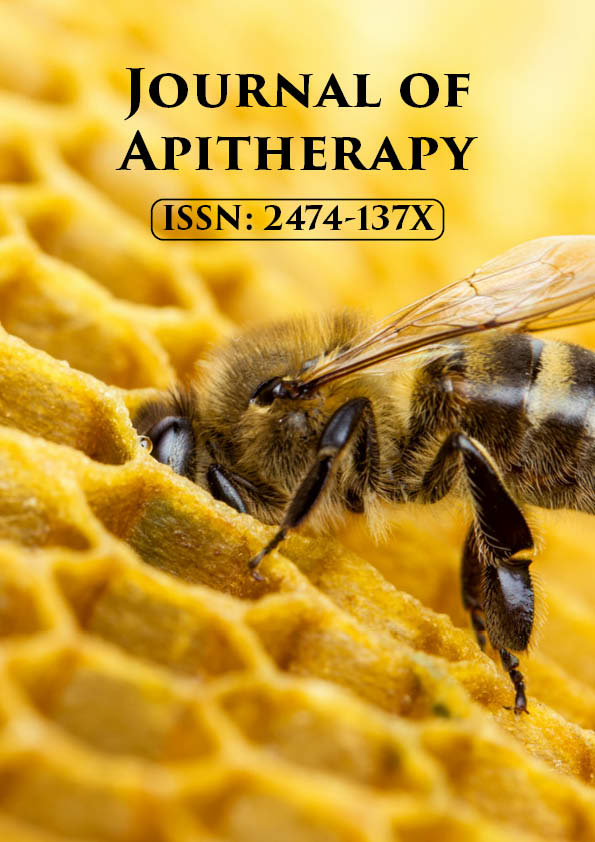Opinion Article - Journal of Apitherapy (2023)
Melittin Research: The Therapeutic Potential of Bee Venom Peptide
Laura Jones*Laura Jones, Department of Pharmaceutical Sciences, University of Science and Technology, Bangladesh, Email: Laura@gmail.com
Received: 09-Sep-2023, Manuscript No. JAPITHERAPY-23-122292; Editor assigned: 11-Sep-2023, Pre QC No. JAPITHERAPY-23-122292 (PQ); Reviewed: 25-Sep-2023, QC No. JAPITHERAPY-23-122292; Revised: 02-Oct-2023, Manuscript No. JAPITHERAPY-23-122292 (R); Published: 09-Oct-2023
Description
Melittin, a peptide component found in bee venom, has become a focal point of research in recent years due to its remarkable biological properties. Derived from the venom of honeybees, melittin is known for its potent antimicrobial, anti-inflammatory, and anticancer activities. This article delves into the intricacies of melittin, exploring its molecular structure, historical context, and the diverse range of therapeutic applications it holds promise for.
Molecular structure of melittin
Melittin is a small peptide consisting of 26 amino acids, making it the principal active component in honeybee venom. Its molecular structure is amphipathic, featuring a hydrophobic N-terminus and a hydrophilic C-terminus. This unique structure allows melittin to interact with a variety of biological membranes, leading to its diverse array of biological effects.
Hemolytic activity: One of the notable features of melittin is its ability to lyse red blood cells. This hemolytic activity arises from its capacity to form pores in cell membranes, leading to the leakage of cellular contents. While this property may sound harmful, it has been harnessed for therapeutic purposes, such as in targeted drug delivery systems.
Therapeutic applications of melittin
Antimicrobial properties: Melittin exhibits potent antimicrobial activity against a wide range of bacteria and fungi. Its mechanism of action involves disrupting the integrity of microbial cell membranes, leading to cell lysis. This makes melittin a promising candidate for the development of novel antimicrobial agents to combat drug-resistant pathogens.
Analgesic properties: Melittin has shown promise as an analgesic, or pain-relieving, agent. Its ability to modulate pain perception may offer an alternative approach to managing chronic pain conditions. While the exact mechanisms are still being elucidated, melittin's impact on neurotransmitter release and neuronal signaling pathways are areas of active research.
Anticancer potential: One of the most exciting areas of melittin research is its potential as an anticancer agent. Studies have demonstrated that melittin can induce apoptosis (programmed cell death) in cancer cells while sparing normal cells. This selectivity makes melittin an attractive candidate for developing targeted cancer therapies with minimal side effects.
Melittin, the powerhouse peptide derived from bee venom, is captivating the scientific community with its multifaceted therapeutic potential. From its antimicrobial and anti-inflammatory effects to its promising applications in cancer treatment and neuroprotection, melittin is emerging as a versatile tool in the quest for innovative medical solutions. As research continues to unravel the molecular intricacies of melittin and address challenges related to toxicity and delivery, the prospects for harnessing this bee venom peptide for the betterment of human health are indeed promising. The journey of melittin research not only highlights the importance of understanding nature's intricacies but also underscores the potential of ancient remedies to inspire modern medical breakthroughs.
Melittin, a potent peptide found in bee venom, has emerged as a focal point in scientific research, unveiling a myriad of therapeutic potentials. This peptide, known for its antimicrobial and anti-inflammatory properties, has captured the attention of the medical community for its promising applications in various health conditions. Studies exploring the therapeutic potential of melittin have revealed its efficacy in combating infections, thanks to its ability to disrupt bacterial cell membranes. Additionally, melittin demonstrates anti-inflammatory effects by modulating immune responses, making it a potential candidate for treating conditions associated with chronic inflammation.
Beyond its antimicrobial and anti-inflammatory properties, melittin has shown promise in cancer research. Researchers are investigating its potential to inhibit the growth of cancer cells and disrupt tumor progression. Furthermore, melittin has exhibited neuroprotective effects, suggesting its potential use in neurological disorders. While the therapeutic applications of melittin are encouraging, further research is essential to understand its mechanisms of action and ensure safety in clinical settings. The exploration of melittin opens new avenues for drug development, harnessing the power of nature's pharmacy to address diverse medical challenges.







